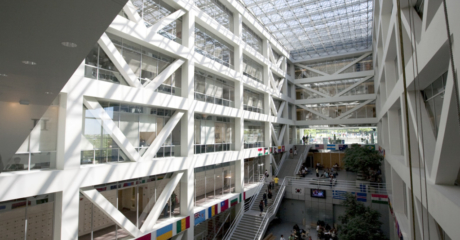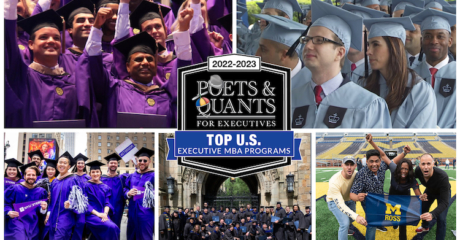This is the granddaddy of all Executive MBA programs, which debuted in the midst of World War II in 1943. Building on that rich history, Chicago’s Booth School of Business offers a world-class program taught by some of the best business academics anywhere. The general management curriculum at Booth, with its emphasis on strategy and leadership, is designed to refresh, expand, and strengthen students’ grounding in the fundamental disciplines of business.
And recently this program had the benefit of a major overhaul after a nine-month faculty review. At a time when many institutions are lightening the workloads of their Executive MBA programs and awarding the degree in shorter timeframes, Chicago continues to have one of the most rigorous and academically challenging programs in the world. The school last year increased the international exchange portion of the program to five weeks from four, doubled the number of required electives so that students can specialize in a discipline, and tossed into the program a full menu of leadership exercises that had long been an entry hallmark of its full-time MBA experience. Booth also added a three-month-long capstone course that provides the opportunity for students to integrate concepts and tools from much of the curriculum in a multi-round simulation culminating in presentations to a panel of investor-judges. The simulation requires competing teams of students to maximize revenue for a fictitious company.
A unique strength of the program is that it boasts three campuses on three continents–downtown Chicago, London, and Hong Kong, making this a true global adventure that helps you build an enduring international network. The 270 admitted students–90 from each of the three locales–begin the program together in late June at Chicago Hyde Park campus. “The very first day, we bring them to Rockefeller Chapel, our dean welcomes them, and then we have them envision themselves here in that very same space 21 months later walking down the aisle receiving their degrees,” says Patty Keegan, associate dean of the EMBA program at Chicago. “It’s a terrific ceremony. Then, they go to school. They take a leadership course, financial accounting and microeconomics that week. We end the week with a terrific cruise out on Lake Michigan for bonding until everyone returns to their home campus.”
During the 21-month program, students take 13 of the 17 courses together with their colleagues. Each student then selects four electives from a limited menu that has included such topics as entrepreneurship, private equity, options and futures, advanced marketing, and creative leadership. Students can specialize by choosing coursework in a particular academic area. Those areas are capital markets, corporate finance, entrepreneurship, strategy, marketing and leadership and management. Previously, specializations were only possible by paying extra to take an optional week of classes at the end of the program. Students now get to choose from among 12 to 18 different elective offerings and take four electives without an additional tuition fee.
During the second summer of the program, students from the three campuses work and study together as part of five one-week international exchange sessions. A total of five weeks is spent working with students from the other two campuses. There are three sessions in Chicago and one each in London and Hong Kong. Don’t think you’ll be on vacation in Europe and Asia. During those sessions, classes meet Monday through Saturday, starting at 9 a.m. and ending at 5 p.m. with a break for lunch and some study time.
At a time when most business schools are forging loose partnerships with other institutions to go global more quickly, Chicago remains committed to its original objective of using the same core faculty, based in Chicago, to deliver the programs in the three locations, a point of distinction recently made by new Booth Dean Sunil Kumar. In an interview with Poets&Quants, the former Stanford B-school professor said, “I completely subscribe to Chicago’s strategy of doing it on its own, not merely because it is a differentiating factor but primarily because the value of this institution has always been that it has had the highest academic standards. In some sense it’s easier to guarantee that by yourself. That does, of course, constrain our scale. It would take quite a bit to move me off this position that maintaining quality goes first.”
Chicago strives to avoid the creation (whether actual or perceived) of three sets of faculty who are specific to any one location. ‘‘As soon as you separate faculty for a long period of time, they no longer operate as ‘one,’ and you see a decrease in both collegiality and collaboration,’’ notes former associate dean Bill Kooser in a recent AACSB report that singled out this program as one of the more innovative global MBA offerings.
Though students in the three locations follow the same classes in consecutive order, slight differences in scheduling enable faculty to travel between the three locations to teach. Chicago students attend class on Friday and Saturday, every other week. Students in both London and Singapore attend class Monday through Saturday roughly once a month. A typical faculty member might spend a week in London, take a week off, spend a week in Singapore, and then return home for four to five weeks before repeating the rotation.
The basic curriculum is the same in all locations. Says Kooser, ‘‘What we teach is at a level that is consistent around the world.’’ While professors may adjust the examples they use in class or use cases that involve regional firms, and while each location may bring in guest speakers to focus on regional issues, no substantial variations are implemented in the program across locations.
In fact, consistency across the campuses extends beyond the faculty and curricula. Kooser reports that a constant challenge for the school is to ensure consistent quality in facilities and technology. ‘‘When students from Singapore visit the Chicago or London campus[es], for example,’’ he says, ‘‘it is only natural for them to compare the facilities and services available in the other locations with what they have experienced at their home campus.’’ This consistency also is important for faculty who travel between the locations so as to ensure that, as they travel from one location to another to deliver a course, they do not have to adapt to unfamiliar technology or processes. This is the kind of attention to detail you get from a world-class business school that has delivered an EMBA program again and again over many years.
While the London and Hong Kong campuses do not have permanent faculty, each has its own set of ‘‘permanent’’ staff (approximately 11.5 and 10.5 full-time equivalency, respectively) that help manage the location’s day-to-day operations. Led by the managing director for each location, staff members manage local marketing and recruitment efforts, on-site registration, catering and A/V needs, and student services such as course registration and materials. In addition, the school’s Career Services Office and Alumni Office both host staff in the two cities to provide program support as needed. Five staff members support the program in Chicago, but the program also relies on other staff members in the business school and university.
Latest Up-to-Date Executive MBA Rankings:
2014 Poets&Quants: 1
2013 BusinessWeek: 2
2014 U.S. News & World Report: 2
2013 Financial Times: 9
2013 The Economist: 9
Rankings Analysis: For the first time in the four years that Poets&Quants has ranked EMBA programs, Chicago rose to the very top of the list in 2014, nosing out Wharton which had won that honor for three consecutive years.
Across every major ranking, Booth does exceptionally well. It ranks second in the latest Bloomberg BusinessWeek and U.S. News & World Report EMBA rankings. And worldwide, it ranks ninth in both The Financial Times and The Economist surveys, which tend to favor non-U.S. business schools.
As a Class of 2013 grad told BusinessWeek: “The instructors are world class. The students are high caliber. The network is powerful. The knowledge is powerful.” Added another enthusiastic graduate: “Our class sourced students from every inhabited continent except for Australia, which I found to be an exceptional opportunity from a North American-based EMBA program. Further, alumni consistently return to the program to participate in EMBA electives week and alumni are also offered to attend three free MBA courses of their choice in the future. There is a nice continuing education and future network aspect to the program that I find very attractive.”
Application Fee: $100
Tuition & Fees: $168,000, including hotel accommodations and many meals
Student Perspectives:
My Story: Balancing a Job as an Eye Surgeon with Going to Booth
Average Months of Work Experience: 152
GMAT Required: No, academic potential is based on prior academic record and work history
Enrollment: 555
International: 8%
Female: 22%
African-American: 11%
Asian-American: 26%
Hispanic/Latino: 2%
Mean Age: 36
Classes Meet: Alternate weekends with occasional week-long sessions
Length of Program: 21 months
Students From These Sectors:
- Financial Services: 22%
- Pharmaceutical/Biotechnology/Health Care: 17%
- Consulting: 13%
- Petroleum/Energy: 10%
- Technology: 7%
- Manufacturing: 7%
- Government: 4%
- Media/Entertainment: 2%
- Real Estate: 1%









